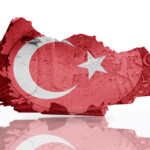‘At 54, the former head of the secret services has a rare advantage in Turkey: He knows not only the army from the inside, but also the arcana and intricacies of civilian administration.’
For 13 years, Hakan Fidan remained in the shadow of his protector, always there when needed at meetings, backstage, and in formal photographs, but from a safe distance. When Turkish President Recep Tayyip Erdoğan traveled abroad with his foreign minister, Mevlut Cavusoğlu, he was the other man in the delegation, a prince of shadow politics, as efficient as he was discreet.
Now at the helm of Turkish diplomacy, Fidan has never spoken much, but when he headed the Milli Istihbarat Teskilati (MIT), Turkey’s intelligence service, his voice carried no less weight.
He had the ear of Erdoğan, so much so that he was presented as the country’s most powerful politician after his mentor. The most loyal, long in charge of the regime’s dirty work, is seen as a possible successor to the president. Erdoğan once eloquently said Fidan was his “black box.”
So when re-elected Erdogan threw his name into the spotlight by appointing him head of the ministry of foreign affairs last month, the decision came as no surprise. He had long been talked of for the job.
As head of intelligence, Fidan managed the Middle East’s burning issues. He paved the way for the resumption of relations with Egypt and Saudi Arabia. More so than Çavusoglu, he led the negotiations with Libya and Syria, with which Erdogan is trying to renew ties with the help of Moscow.
Speaking to journalists at the ceremonial transfer of authority held at Turkey’s Ministry of Foreign Affairs earlier this month, Fidan said: “I will pursue the national vision of foreign policy.” For years, Ankara has championed a diplomacy based on the concept of strategic autonomy, aimed at determining its policy on the international stage independently, without external influence or constraint. This framework fits the talented jack-of-all-trades like a glove.
On June 21, at the international conference on the reconstruction of Ukraine in London, Fidan said, “Turkey [was] determined to guarantee the independence, sovereignty and territorial integrity of Ukraine, including Crimea, the former homeland of the Tatar Turks.”
The statement speaks volumes about the Turkish government’s degree of involvement in Ukraine. At a meeting with United States Secretary of State Antony Blinken, whom he has crossed paths with on numerous occasions, the new minister treated him with a casual “Thank you Tony.”
When a copy of the Koran was burned in Stockholm last week, Fidan came up with harsh words: “To tolerate such heinous acts is to be an accomplice.” The message was directed at Sweden, which sees the prospect of NATO membership at the Alliance’s Vilnius summit on July 12, further receding due to Hungarian and Turkish obstruction. It was also a way of pandering to the Islamic-nationalist electorate, the bedrock of Erdoğan’s power.
At 54, the former head of the secret services has a rare advantage in Turkey: He knows not only the army from the inside, but also the arcana and intricacies of civilian administration.
Born in Ankara to a father of Kurdish origin, he graduated from the military academy and the military school of linguistic studies at the age of 18. He served as a private for fifteen years, before completing his military training in Germany as a non-commissioned officer in a NATO Rapid Reaction Force unit.
With a double degree — a degree in management from the University of Maryland in the United States and a doctorate in international relations from Bilkent University in Ankara — he decided to pursue a career in civilian life.
After writing a thesis on Iran’s energy policy, he was successively posted to the International Atomic Energy Agency (IAEA) in Vienna, then to the United Nations Institute for Disarmament Research in Geneva, before joining the Turkish Cooperation and Development Agency (TIKA), Turkey’s lever of influence in developing countries, particularly in Turkey.
Quickly spotted, in 2007 he joined the cabinet of Recep Tayyip Erdoğan, then prime minister, as deputy undersecretary of state, a position of foreign policy adviser.
In 2009, at a time when Ankara was trying to bring the West and Tehran closer together on the Iranian nuclear issue, Hakan Fidan, who was involved in mediation, defended the Islamic Republic’s right to conduct an atomic programme for peaceful purposes. The following year, he was appointed head of MIT, the Turkish intelligence service.
He immediately reorganized the agency, making it even more powerful by incorporating military intelligence. However, the beginnings of this discreet man, by nature and function, provoked a surprising number of headlines in the media. Erdoğan’s henchman found himself at the heart of a controversy that erupted in 2013 after the publication of an article in the Washington Post.
According to columnist David Ignatius, Israel, which sees him as a friend of Tehran, accused him of having passed on to the Islamic Republic the names of a dozen of its spies in Iran.
The German-language Swiss daily Neue Zürcher Zeitung recently devoted a long portrait to him, in which it says that he also maintained good relations with General Ghassem Soleimani, who headed the Revolutionary Guards’ external operations before being killed by the United States in 2020.
Hakan Fidan tackled the most sensitive issues, reporting directly to the head of state. For several years, he acted as the President’s intermediary in secret negotiations with the Kurdish guerrilla group, the Kurdistan Workers’ Party (PKK).
He went to Imrali prison, establishing a relationship of trust with the imprisoned leader of the movement, Abdullah Öcalan, who, in messages to his lawyers, was full of praise for him. So much so that an Ankara judge opened an investigation, accusing the intelligence chief of having “illegal exchanges with terrorists”.
This time, it is Erdoğan himself who is standing in the way. He assumed full
responsibility for the negotiations. We would later discover that this episode was one of the first in the fratricidal war that Erdoğan’s men waged against the Gülenist networks, followers of the conservative preacher Fethullah Gülen, who were very well integrated into the state apparatus.
The Sunni imam, who now lives in Pennsylvania, has always refused to tackle the Kurdish question. And Hakan Fidan, unlike other members of the ruling Justice and Development Party, was known to have little sympathy for the Kurdish Brotherhood.
The culmination of this war came in the summer of 2016, with the failed coup d’état by a faction of the military. Here again, Hakan Fidan had a front-row seat, but in a very strange way. On the afternoon of 15 July, he was informed of suspicious activities, notably at an air base near Ankara. At 4pm, the MIT boss informed the Chief of Staff, Hulusi Akar, but not the civil authorities.
“I heard the news from my brother-in-law at 8pm”, said Recep Tayyip Erdoğan, who was on holiday in the seaside town of Marmaris. The President did not escape from his holiday in the government jet until three hours after the putsch began.
Once the situation was under control, Mr Erdoğan reportedly told his right-hand man: “You failed the exam”, while refusing to accept his resignation. “You don’t change horses in the middle of the ford”, the Ankara strongman later explained to several media outlets.
To this day, it remains unclear whether Hakan Fidan hesitated because his information was not precise enough or whether he deliberately let the putschists launch their attempt in order to catch them in a bigger trap.
According to the daily Hürriyet, the debriefing with the President lasted several hours. “You now have a stain on your record,” Mr Erdoğan reportedly chastised him. “I’m ready to do whatever you order,” Mr Fidan is reported to have replied.
Subsequently, the head of the MIT never stopped hunting down PKK leaders and followers of the preacher Gülen. Without a word, or almost without a word, as a good soldier of the “Reis,” Fidan has prospered in the grey areas of power, and the opacity of the intelligence field has served him well.
But the “black box” is now in the spotlight.
He’s going to have to get used to it.
This article was originally published in Le Monde.
The views and opinions expressed above are the author’s and do not reflect those of the Free Turkish Press.


